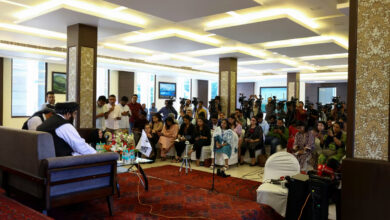Countless women actively participated in the 25 January revolution, which seemed to signal a major shift in women’s role in Egyptian society. But activists say there is still a long way to go toward eradicating gender inequality, starting with Egypt's Constitution.
The 1971 Egyptian Constitution, currently suspended, includes articles that ostensibly ensure equality and outlaw discrimination based on gender, ethnic origin, language, religion or belief. But according to Egyptian gender experts, the situation is far more complicated — and discriminatory — than a quick reading of the old constitution suggests.
And if women’s rights are to be guaranteed in post-Mubarak Egypt, the new version, written by a committee selected by the parliament elected in September 2011, will require substantial changes on laws regulating gender.
Article 2 of the 1971 Constitution — included in the 62-article interim constitution issued by the Supreme Council of Armed Forces in March — establishes that Islamic jurisprudence (sharia) is “the principle source of the legislation.” The primary sources of the sharia are the Quran and the example of the Prophet Mohamed.
According to Douaa Hussein, a human rights and gender consultant, the misinterpretation of sharia law is the main factor leading to discrimination against women and minority groups, specifically when it comes to personal status law, which determines women's rights to ownership, inheritance, education, employment and criminal law. Hussein and some other rights advocates support the abolition of Article 2 in the forthcoming constitution.
Not all rights advocates do, however. Marwa Sharafeldin, co-founder of the Network for Women's Rights Organizations in Egypt, would prefer to see religion as a force supporting equality by adopting Islamic jurisprudence that promotes equality, as family law does in Morocco.
“We need to do the same, to build on already existing egalitarian Islamic jurisprudence and develop it ourselves too,” said Sharafeldin. “Doing otherwise is like using Islam to justify inequality and discrimination, which is far from reality and does not do justice to Islam.”
Maha Al Aswad, a program officer with the Cairo Institute for Human Rights Studies, worries that the principles of Islamic law are subject to the interpretation of conservative judges and sheikhs, and this is what limits women’s rights.
As women’s issues related to marriage, divorce, inheritance, alimony and the penalization of adultery are regulated by a combination of sharia and patriarchal law, Egyptian women are still subject to polygamy. Sharia is sometimes used to justify polygamy despite disputes over its Quranic legitimacy.
Women in Upper Egypt and rural areas do not share the same rights to inheritance and law as men due to tradition and culture. Some argue that this form of inequality is protected by Article 2.
Article 11 faces similar problems. It guarantees women's right to reconcile careers with family duties by respecting the principles of Islamic law. Hussein said that despite proclaiming equality it supports the stereotype that women’s role is to take care of the family — while disregarding men’s role entirely.
This kind of discrimination affects other legal frameworks beyond the constitution, as well. Women are not allowed to occupy positions in State Council.
“Last year, on 15 February, 334 male judges voted against the appointment of females to judicial posts during a State Council General Assembly meeting,” Al Aswad said.
There are currently 30 female judges in Egypt, all appointed by presidential decree in 2007. But Al Aswad argues that the informal law does not allow women to apply normally nor be promoted to become judges, as their male colleagues are.
Women are also prohibited from working in public prosecution.
Another controversial issue is the female quota system, which reserved 64 parliamentary seats for female candidates. Some experts are currently asking that this system be abolished. Others see it as a step toward more equal participation of women in politics.
The Egyptian Center for Women's Rights (ECWR) initially welcomed the quota system as “a good initiative” that could give women the opportunity to prove their ability, but later the organization said it must be a temporary solution and it is not sufficient to integrate women into politics.
Al Aswad strongly believes that it only reinforces gender roles and that in Egypt, the issue must be tackled with a different approach.
“Call for equality by taking to the streets and having a voice, by building grassroots women leaders, not by imposing it on society by law,” Al Aswad said.
Hussein, on the contrary, explains that the presence of the female quota system is of high importance in the current transitional phase, especially in the context of what seems to be rising power of Islamist factions.
Women’s advocates hope that the new Constitution will better ensure equality for women, but the early signs aren’t strong.
Last month’s constitutional referendum ratified an amendment to Article 75, which established that Egypt’s president cannot be married to a non-Egyptian woman. The sentence’s formulation suggests that candidates will be male, although in Arabic the masculine gender is used to refer to both sexes. This is an “expression of misogyny” and should be avoided in the future, Al Aswad said.
The key to creating a more equitable Egyptian constitution, experts say, will be including different segments of Egyptian society in the committee — women as well as representatives from minority groups. The authors of the constitution must include those who have not had access to Parliament. They say that only these terms can guarantee the rights of all those who helped make the revolution possible.




